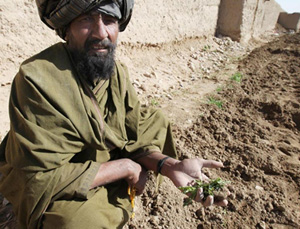| Home | Blog | Ask This | Showcase | Commentary | Comments | About Us | Contributors | Contact Us |

Questioning the fundamentals in AfghanistanASK THIS | May 17, 2012How does supporting warlords help create a stable government? Why are we counting the money spent instead of the good achieved? A scholar who has done extensive field research in Afghanistan on the intended and unintended effects of foreign aid writes that reporters are missing some of the key dynamics at play there. By Karl Sandstrom Q. How do you achieve long-term stability through repression? The objective in Afghanistan is supposedly "stabilization" -- movement toward a sustainable, peaceful society where threats against the national security of the U.S. and its allies are not allowed to develop. This would suggest a preferred outcome where a sustainable center controls Afghanistan and can grant the U.S. operational capacity. But the U.S. has empowered and supported various warlords over the last decade. One of the best known and most controversial is the acting chief of police in Kandahar, Abdul Raziq, also the commander of the border police in Spin Boldak (see for example Our Man in Kandahar, from the Atlantic.) One American official told me: “At least we know he is not Taliban”. But that is a slim comfort if he turns out to be not of, or for, the people. It seems odd that these are the faces of justice that we are demanding that the population trust. But there is a notable lack of public debate and reporting on whether resurrecting the warlord system of impunity is a sustainable way forward. In some cases, these are the very type of characters the Taliban came to power by helping local populations defeat. In other areas they are people with popular or ethnically based support but local histories of patrimonial exclusivism that exacerbates social friction, impunity and injustice. Then again, any debate now would probably be too late. Thanks to all the funds and weapons they have been provided, the warlords are becoming independent not only of their constituencies but of American as well as Afghan government control. The U.S. military commander’s discretionary funds (CERP) and Provincial Reconstruction Team (PRT) activities have been a massive part of this development, but many civilian actors also seem to miss the distinction between working with -- as opposed to through -- power-holders and gatekeepers. Q. Is fostering impunity the same as ‘development’? There are thousands of small projects all over Afghanistan for which the U.S. and other governments have extremely weak if even existing monitoring and follow-up capacities. Yet in project reports it is very rare to encounter anything other than success narratives, rarely questioned by the mainstream press. Journalists should revisit these alleged successes, preferably through field visits, and ask serious questions about outcomes. In the United Kingdom, the watchdog Independent Commission for Aid Impact (ICAI), recently released a report that classified UK aid efforts in Helmand province as "Amber-Red" -- one step up from what has to be seen as very close to mission fail. Reports on USAID and AUSAID and so on have recently found similar problems, but have been dismissed wholesale. To those of us on the outside of the system in Afghanistan it is a bit of a challenge to actually find the often proclaimed successes. That is not to say that there are not road projects, infrastructure development, and much more pornography available (if you consider that progress), but there is a difference between output and outcome that seems hard to grasp for some. The bottom line question is whether the aid and development agencies are able or even interested in actually measuring outcomes rather than outputs -- and it is an issue worth addressing. Measuring disbursement levels says nothing of the impact in the local communities. A road does not only allow better market access, it also allows your local enemies easier access to your village. If your local long-time rivals are getting help from the Americans, maybe you go look for help somewhere else? Does it really matter if your enemies are now called the "Afghan Local Police"? Does it matter if they call you an insurgent? A January report from the Feinstein International Center at Tufts -- along with my own research -- suggests that implementation through long delivery-chains has created a situation where a lot of money is thrown at things but the actual socio-political impact is conveniently ignored. How resources are actually used close to ground level largely passes under the radar. What's happening at the points of implementation, according to the Afghans interviewed across the country, is a pattern of exclusive and illicit appropriation of supplied resources making the rich richer, and the poor poorer. This pattern is played out by the very people we are asking the Afghans to trust. There is little use crying about "widespread corruption" when you are feeding the system directly and actively turning a blind eye, and even less so after a decade of wilful ignorance at best. Is this part of teaching accountability?
|
|
||||||||||||




